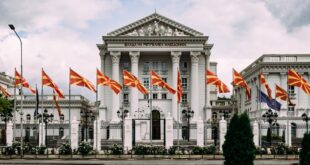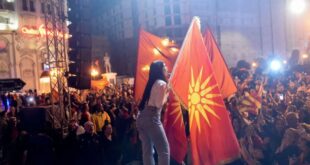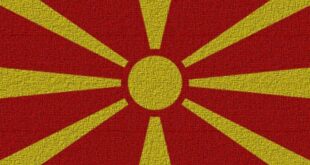Macedonia and Kosovo have established full diplomatic ties by deciding to exchange ambassadors, both countries’ foreign ministries confirmed in Sunday press releases.
The US and EU have praised the move, while Serbia, which strongly opposes Kosovo’s independence declaration, protested.
The agreement was inked by Macedonian Foreign Minister Antonio Milososki and his Kosovo counterpart, Skender Hiseni, in Skopje and Pristina late on Saturday. The countries’ parliaments approved a related mutual border accord almost immediately thereafter.
“Both sides pledge to strengthen [their] friendship based on the respect of their national sovereignty, independence and territorial integrity,” the Macedonian Foreign Ministry statement reads.
The Kosovo ministry says that the exchange of ambassadors will “strengthen the peace and stability” of the Balkans by providing the basis for “development, cooperation, and mutual understanding” between the two countries.
Macedonia recognised Kosovo last year, several months after its neighbour declared Kosovo declared independence last year, Pristina independence.
However, Skopje refused to send an ambassador to Pristina before the full demarcation of their mutual border, undefined since the breakup of Yugoslavia in the 1990s. The Macedonia-Kosovo border was left unmarked, due to a long-standing spat between Belgrade and Pristina over which has jurisdiction over the Kosovo side of the border.
Following the 1999 NATO military campaign against Serbia, Belgrade lost effective control of the province and Kosovo became an international protectorate.
“This is good for both states and for the entire region,” the US ambassador to Macedonia, Philip Reeker, told media on Sunday, in reaction to the Kosovo-Macedonia border agreement and establishment of full bilateral diplomatic ties.
The EU ambassador to Macedonia, Erwan Fouere, viewed the move as a reflection of the “mutual trust and responsibility of both governments”. The UK and Albania also expressed their support.
“I congratulate both countries on this step forward that further enhances the stability of the region,” UK Minister for Europe Chris Bryant said.
Saying that Macedonia’s decision to send an ambassador to Pristina is “regrettable” Serbian Foreign Minister Vuk Jeremic warned that Skopje was endangering its relations with Belgrade and pledged: “there will be consequences”.
Belgrade argues that the demarcation of the Kosovo-Macedonia border should have been conducted in talks between Serbia and Macedonia.
Macedonia has been under pressure to establish diplomatic ties with Kosovo, since one quarter of its population are ethnic Albanians.
On the other hand, Macedonia has strong economic ties with both Serbia and Kosovo and the loss of either would have a significant impact on the local economy.
Compensation Sought
People from Debelde, a village between Kosovo and Macedonia, are not accepting the border agreement, claiming they have lost 24 hectares of land in the deal and have been unable to work 140 hectares.
Zymri Ilazi, a representative of the village and member of the Kosovo border commission, claimed that Kosovo Prime Minister Hashim Thaci had ignored the people’s requests regarding the demarcation.
“I told Prime Minister Thaci on Friday that we do not accept this agreement. He told me that now everything is finished,” said Ilazi.
He stressed that, since 2001, many families have not been able to work their land because of the actions of Macedonian police. Thaci has agreed to pay compensation for this loss of access, he claimed.
According to Ilazi, compensation will include the retroactive payment of 1,000 euros per hectare to those unable to work their land.
“I cannot confirm any such agreement between Debelde village and the prime minister,” the spokesperson for the premier’s office, Memli Krasniqi, told Balkan Insight.
The spokesperson confirmed that Thaci had met the Debelde representative and explained the importance of the border agreement.
“The villagers can work on their private properties,” said Krasniqi. “The technical part of the agreement, such as stones and the white lines for the border, will happen soon.”
The border agreement was approved in an extraordinary meeting of the Kosovo parliament on Saturday, in a second round of voting, by 81 votes to three, with two abstentions.
 Eurasia Press & News
Eurasia Press & News



